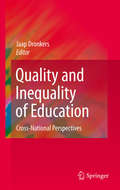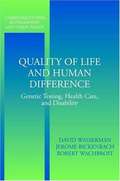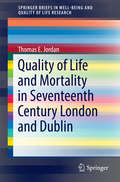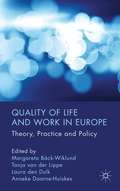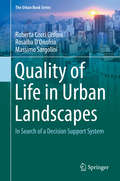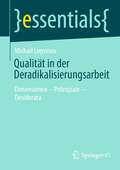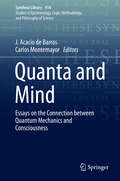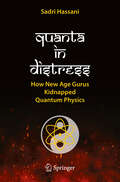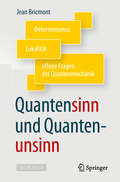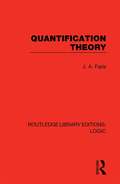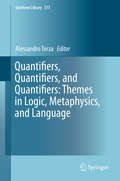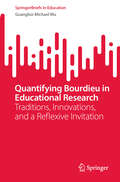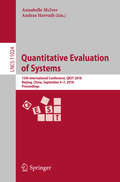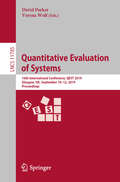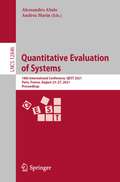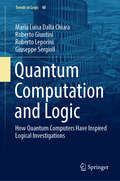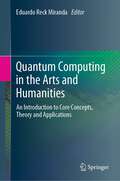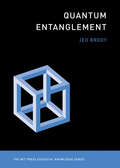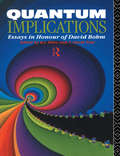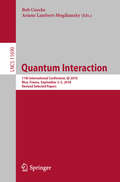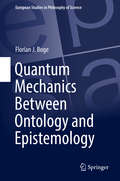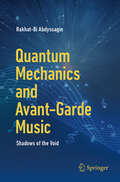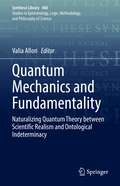- Table View
- List View
Quality and Inequality of Education
by Jaap DronkersThis cogent analysis of data on education and society from a variety of sources sets out to provide answers to scientific and policy questions on the quality of education and the way it relates to various forms of inequality in modern societies, particularly in Europe. The authors examine not only the well known cross-national PISA datasets, but also the European Social Survey and TIMSS, going further than many researchers by folding into their analyses economic, legal and historical factors. Most research up to now using the PISA data is restricted to educational research. Interesting as that educational question is, the chapters here use the PISA, and other data, to explore more profoundly the relationship between education and the various forms of inequality in European and other modern societies. The work comes from two different perspectives: one that looks at how the different characteristics of societies, their economies, and their educational systems influence the average educational achievements of specific groups of pupils, such as immigrants, in those societies; and a second, which explores how, and in what degree, the characteristics of schools, educational systems and labour-markets either hardens or softens differences in the educational outcomes of various groups of pupils. With a special feature of the book being its emphasis on comparing Asian and European countries, and with the content free of the political constraints that can often attend studies of these datasets, this book will be an vital resource for educationalists and policy-makers alike.
Quality of Life and Human Difference: Genetic Testing, Health Care, and Disability
by Jerome Bickenbach David Wasserman Robert WachbroitThis study brings together two important literatures one volume. One concerns the role of quality assessments in social policy, especially health policy. The second concerns ethical and social issues raised by prenatal testing for disability. Hitherto, these two literatures have had little contact with each other: few scholars have written about both, or have compared the two domains in a systematic way, while people with disabilities and disability scholars are underrepresented in recent discussion on health policy and quality of assessment. This book turns the perspectives of disability scholars on issues that have largely been the province of health methodology, policy and philosophy, while angling philosophical policy analysis on problems that have largely been the province of disability scholarship. This volume will be sought after by bioethicists, philosophers, and specialists in disability studies and healthcare economics.
Quality of Life and Mortality in Seventeenth Century London and Dublin
by Thomas E. JordanThis book provides an examination of the quantitative and qualitative factors affecting mortality in two major cities of the British Isles: London and Dublin. It covers a scale from individuals mentioned by name to aggregates of mortality data in the Bills of Mortality. Focusing on the Seventeenth Century, the book pays attention to the Great Plague of 1665, and to earlier years in which epidemics decimated populations. To the average person living in the seventeenth century, life was a series of challenges. Mortality among the young was high, and for those who survived early childhood, death in their fifties was fairly typical. Men and women might aspire to a longer life span, but even the healthiest practices were no guarantee when the overall quality of life was low. With fatal illnesses exemplified by typhoid fever on the one hand, and the arrival of yersinia pestis plague through ports on the Mediterranean at regular intervals of several years, on the other, mortality became a foreseeable event. "
Quality of Life and Work in Europe
by Margareta B�ck-Wiklund Tanja van der Lippe Laura Den Dulk Anneke van Doorne-HuiskesIntense globalization, rapidly changing workplaces and family patterns have renewed the international interest in quality of life. This book examines different institutional arrangements, work-place conditions and gendered work and care that affect the conditions for achieving quality of work and life in European countries.
Quality of Life in Urban Landscapes: In Search Of A Decision Support System (The Urban Book Series)
by Roberta Cocci Grifoni Rosalba D'Onofrio Massimo SargoliniThis volume introduces an innovative tool for the development of sustainable cities and the promotion of the quality of life of city inhabitants. It presents a decision-support system to orient public administrations in identifying development scenarios for sustainable urban and territorial transformations. The authors have split the volume into five parts, which respectively describe the theoretical basis of the book, the policies in question and indicators that influence them, the decision-support system that connects indicators to policies, the case study of Ancona, Italy, and potential future directions for this work. This volume is based on transdisciplinary research completed in May 2016 that involved about 40 researchers at The University of Camerino, Italy and other European universities. With purchase of this book, readers will also have access to Electronic Supplementary Material that contains a database with groups of indicators of assessment of urban quality of life and a toolkit containing the data processing system and management information system used in the book's case study.
Qualität in der Deradikalisierungsarbeit: Dimensionen – Potenziale – Desiderata (essentials)
by Michail LogvinovDieses essential behandelt Potenziale und Handlungsbedarfe der Qualitätsförderung in der Deradikalisierungsarbeit. Durch die Benennung einzelner Qualitätsdimensionen und -kriterien wird ein praxisorientierter Beitrag zu den kontrovers diskutierten Themen Qualität, Wirkung und Effektivität von Maßnahmen geleistet. Als Vergleichsgrundlage fungieren dabei die Qualitätsdebatte in der Sozialen Arbeit, englischsprachige Forschungen zur Effektivität und Leistungsfähigkeit von Non-Profit-Organisationen, die Qualitätssicherung in der Kriminalprävention und die evidenzorientierte Erforschung der Umsetzungsqualität von Resozialisierungsprogrammen. Im Ergebnis wird eine Reihe von Ansätzen, Standards, Indikatoren und Prädiktoren diskutiert, die für die interne Qualitätsentwicklung der Fachpraxis einen Mehrwert ergeben.
Quanta and Mind: Essays on the Connection between Quantum Mechanics and the Consciousness (Synthese Library #414)
by Carlos Montemayor J. Acacio de BarrosThis edited volume examines aspects of the mind/consciousness that are relevant to the interpretations of quantum mechanics. In it, an international group of contributors focus on the possible connections between quantum mechanics and consciousness. They look at how consciousness can help us with quantum mechanics as well as how quantum mechanics can contribute to our understanding of consciousness. For example, what do different interpretations aimed at solving the measurement problem in quantum mechanics tell us about the nature of consciousness, such as von Neumann's interpretation? Each interpretation has, associated to it, a corresponding metaphysical framework that helps us think about possible “models” of consciousness. Alternatively, what does the nature of consciousness tell us about the role of the observer and time reversibility in the measurement process? The book features 20 papers on contemporary approaches to quanta and mind. It brings together the work of scholars from different disciplines with diverse views on the connections between quanta and mind, ranging from those who are supportive of a link between consciousness and quantum physics to those who are very skeptical of such link. Coverage includes such topics as free will in a quantum world, contextuality and causality, mind and matter interaction, quantum panpsychism, the quantum and quantum-like brain, and the role of time in brain-mind dynamics.
Quanta in Distress: How New Age Gurus Kidnapped Quantum Physics
by Sadri HassaniThis book deconstructs and debunks the lucrative and widespread marriage of quantum physics with pop-spirituality while tracing this pernicious strain of pseudoscience to its source: the founders of quantum mechanics themselves. The association of mystical ideas with modern physics in the self-improvement industry is not new. The “spookiness” of quantum properties like uncertainty and entanglement has proven fertile ground for new-age mystics and alternative medicine advocates who saw a way to put a scientific veneer on their claims. In the early days, the founders of quantum physics accused it of implying an observer-created reality. Later, Taoists and Wu Li dancers were quantized. Then ancient Indian medicine, Ayurveda, morphed into “quantum healing.” Little wonder The Oprah Winfrey Show told its viewers: think about losing weight, making more money, and falling in love, and you’ll become thin, wealthy, and happily married … all based on quantum physics. Criticism of the pseudoscientific misappropriation of quantum physics has been widespread but inadequate; thus far, the scientific community has failed to account for its own role in the fusion of pop-spirituality and quantum physics. As well as thoroughly exploring and debunking quantum mysticism, this book traces the development of quantum mysticism and pulls no punches in exposing the unwitting role of quantum theory’s founders in propagating quantum mysticism.
Quantensinn und Quantenunsinn: Determinismus, Lokalität und offene Fragen der Quantenmechanik
by Jean Bricmont Carl FreytagMit diesem Buch entwirrt Jean Bricmont die vermeintlichen Rätsel und Mysterien der Quantenmechanik und erklärt Laien die Grundprinzipien der Quantentheorie. Dabei unterstreicht er auf unterhaltsame Art deren paradoxe Natur und entwirrt die unglaubliche Menge an Fehlvorstellungen, Pseudowissenschaft und falscher Philosophie, die viele populäre Diskussionen zur Quantenmechanik begleiten.Mit möglichst wenig Mathematik und Fachsprache, liefert er den Leserinnen und Lesern Antworten auf die wichtigsten konzeptionellen Fragen, die mit der Quantenmechanik verbunden sind:· Die Frage des Determinismus: Läutet die Quantenmechanik das Ende einer deterministischen Weltansicht ein? Erklärt oder rechtfertigt sie den „freien Willen“?· Die Rolle des "Beobachters" in der Wissenschaft: Welche Rolle spielt der Mensch als Subjekt und Beobachter im physikalischen Prozess?· Die Frage der Lokalität: Sagt die Quantenmechanik, dass es in der Natur „spukhafte Fernwirkungen“ gibt? Und steht das nicht im Gegensatz zur Aussage der Relativitätstheorie, dass sich nichts schneller als das Licht bewegen kann?Das Buch gibt keine endgültigen Antworten auf diese Fragen, sondern eröffnet mögliche Lösungen, die in der wissenschaftliche Gemeinschaft immer noch diskutiert werden und jenseits dessen liegen, was in üblichen Vorlesungen und populären Büchern über Quantenmechanik zu hören ist.
Quantification Theory (Routledge Library Editions: Logic)
by J. A. FarisOriginally published in 1964. This book is concerned with general arguments, by which is meant broadly arguments that rely for their force on the ideas expressed by all, every, any, some, none and other kindred words or phrases. A main object of quantificational logic is to provide methods for evaluating general arguments. To evaluate a general argument by these methods we must first express it in a standard form. Quantificational form is dealt with in chapter one and in part of chapter three; in the remainder of the book an account is given of methods by which arguments when formulated quantificationally may be tested for validity or invalidity. Some attention is also paid to the logic of identity and of definite descriptions. Throughout the book an attempt has been made to give a clear explanation of the concepts involved and the symbols used; in particular a step-by-step and partly mechanical method is developed for translating complicated statements of ordinary discourse into the appropriate quantificational formulae. Some elementary knowledge of truth-functional logic is presupposed.
Quantifiers, Quantifiers, and Quantifiers: Themes in Logic, Metaphysics, and Language
by Alessandro TorzaThis volume covers a wide range of topics that fall under the 'philosophy of quantifiers', a philosophy that spans across multiple areas such as logic, metaphysics, epistemology and even the history of philosophy. It discusses the import of quantifier variance in the model theory of mathematics. It advances an argument for the uniqueness of quantifier meaning in terms of Evert Beth's notion of implicit definition and clarifies the oldest explicit formulation of quantifier variance: the one proposed by Rudolf Carnap. The volume further examines what it means that a quantifier can have multiple meanings and addresses how existential vagueness can induce vagueness in our modal notions. Finally, the book explores the role played by quantifiers with respect to various kinds of semantic paradoxes, the logicality issue, ontological commitment, and the behavior of quantifiers in intensional contexts.
Quantifying Bourdieu in Educational Research: Traditions, Innovations, and a Reflexive Invitation (SpringerBriefs in Education)
by Guanglun Michael MuThis book revolves around the rationale, urgency, and application of quantifying Bourdieu in educational research. It begins with a succinct revisit to Bourdieu’s methodological pluralism and quantitative program, and a critical review of existing but limited Bourdieusian quantitative educational studies, establishing the theoretical, methodological, and contextual foundations for empirical applications of quantitative methodology in Bourdieusian educational research. The book then presents three examples of such empirical applications as individual chapters, utilising multiple correspondence analysis and social network analysis. These chapters respectively examine social class and educational mobility, teacher resilience and teacher education, and social grouping and social change. The book concludes with a proposal to mobilise a range of 'relational' quantitative methodologies – including factor analysis, cluster analysis, logistic regression, multilevel modelling, and cross-lagged panel model – within a Bourdieusian remit, and extends a reflexive invitation to quantify Bourdieu in educational research.
Quantitative Evaluation of Systems: 15th International Conference, QEST 2018, Beijing, China, September 4-7, 2018, Proceedings (Lecture Notes in Computer Science #11024)
by Annabelle McIver Andras HorvathThis book constitutes the proceedings of the 15th International Conference on Quantitative Evaluation Systems, QEST 2018, held in Beijing, China, in September 2018. The 24 full papers presented were carefully reviewed and selected from 51 submissions. The papers cover topics in the field of quantitative evaluation and verification of computer systems and networks through stochastic models and measurements emphasizing two frontier topics in research: quantitative information flow for security and industrial formal methods.
Quantitative Evaluation of Systems: 16th International Conference, QEST 2019, Glasgow, UK, September 10–12, 2019, Proceedings (Lecture Notes in Computer Science #11785)
by David Parker Verena WolfThis book constitutes the proceedings of the 16th International Conference on Quantitative Evaluation Systems, QEST 2019, held in Glasgow, UK, in September 2019.The 17 full papers presented together with 2 short papers were carefully reviewed and selected from 40 submissions. The papers cover topics in the field of Probabilistic Verification; Learning and Verification; Hybrid Systems; Security; Probabilistic Modelling and Abstraction; and Applications and Tools.
Quantitative Evaluation of Systems: 18th International Conference, QEST 2021, Paris, France, August 23–27, 2021, Proceedings (Lecture Notes in Computer Science #12846)
by Alessandro Abate Andrea MarinThis book constitutes the proceedings of the 18th International Conference on Quantitative Evaluation Systems, QEST 2021, held in Paris, France, in August 2021.The 21 full papers and 2 short papers presented together with 2 keynote papers were carefully reviewed and selected from 47 submissions. The papers are organized in the following topics: probabilistic model checking; quantitative models and metamodels: analysis and validation; queueing systems; learning and verification; simulation; performance evaluation; abstractions and aggregations; and stochastic models.
Quantum Computation and Logic: How Quantum Computers Have Inspired Logical Investigations (Trends in Logic #48)
by Maria Luisa Dalla Chiara Roberto Giuntini Roberto Leporini Giuseppe SergioliThis book provides a general survey of the main concepts, questions and results that have been developed in the recent interactions between quantum information, quantum computation and logic. Divided into 10 chapters, the books starts with an introduction of the main concepts of the quantum-theoretic formalism used in quantum information. It then gives a synthetic presentation of the main “mathematical characters” of the quantum computational game: qubits, quregisters, mixtures of quregisters, quantum logical gates. Next, the book investigates the puzzling entanglement-phenomena and logically analyses the Einstein–Podolsky–Rosen paradox and introduces the reader to quantum computational logics, and new forms of quantum logic. The middle chapters investigate the possibility of a quantum computational semantics for a language that can express sentences like “Alice knows that everybody knows that she is pretty”, explore the mathematical concept of quantum Turing machine, and illustrate some characteristic examples that arise in the framework of musical languages. The book concludes with an analysis of recent discussions, and contains a Mathematical Appendix which is a survey of the definitions of all main mathematical concepts used in the book.
Quantum Computing in the Arts and Humanities: An Introduction to Core Concepts, Theory and Applications
by Eduardo Reck MirandaComputers are essential for the functioning of our society. Despite the incredible power of existing computers, computing technology is progressing beyond today’s conventional models. Quantum Computing (QC) is surfacing as a promising disruptive technology. QC is built on the principles of quantum mechanics. QC can run algorithms that are not trivial to run on digital computers. QC systems are being developed for the discovery of new materials and drugs and improved methods for encoding information for secure communication over the Internet. Unprecedented new uses for this technology are bound to emerge from ongoing research.The development of conventional digital computing technology for the arts and humanities has been progressing in tandem with the evolution of computers since the 1950s. Today, computers are absolutely essential for the arts and humanities. Therefore, future developments in QC are most likely to impact on the way in which artists will create and perform, and how research in the humanities will be conducted.This book presents a comprehensive collection of chapters by pioneers of emerging interdisciplinary research at the crossroads of quantum computing, and the arts and humanities, from philosophy and social sciences to visual arts and music.Prof. Eduardo Reck Miranda is a composer and a professor in Computer Music at Plymouth University, UK, where he is a director of the Interdisciplinary Centre for Computer Music Research (ICCMR). His previous publications include the Springer titles Handbook of Artificial Intelligence for Music, Guide to Unconventional Computing for Music, Guide to Brain-Computer Music Interfacing and Guide to Computing for Expressive Music Performance.
Quantum Entanglement (The MIT Press Essential Knowledge series)
by Jed BrodyAn exploration of quantum entanglement and the ways in which it contradicts our everyday assumptions about the ultimate nature of reality.Quantum physics is notable for its brazen defiance of common sense. (Think of Schrödinger's Cat, famously both dead and alive.) An especially rigorous form of quantum contradiction occurs in experiments with entangled particles. Our common assumption is that objects have properties whether or not anyone is observing them, and the measurement of one can't affect the other. Quantum entanglement—called by Einstein “spooky action at a distance”—rejects this assumption, offering impeccable reasoning and irrefutable evidence of the opposite. Is quantum entanglement mystical, or just mystifying? In this volume in the MIT Press Essential Knowledge series, Jed Brody equips readers to decide for themselves. He explains how our commonsense assumptions impose constraints—from which entangled particles break free.Brody explores such concepts as local realism, Bell's inequality, polarization, time dilation, and special relativity. He introduces readers to imaginary physicists Alice and Bob and their photon analyses; points out that it's easier to reject falsehood than establish the truth; and reports that some physicists explain entanglement by arguing that we live in a cross-section of a higher-dimensional reality. He examines a variety of viewpoints held by physicists, including quantum decoherence, Niels Bohr's Copenhagen interpretation, genuine fortuitousness, and QBism. This relatively recent interpretation, an abbreviation of “quantum Bayesianism,” holds that there's no such thing as an absolutely accurate, objective probability “out there,” that quantum mechanical probabilities are subjective judgments, and there's no “action at a distance,” spooky or otherwise.
Quantum Field Theory in Curved Spacetime
by Leonard E. Parker David J. TomsIn this book, Robert Wald provides a coherent, pedagogical introduction to the formulation of quantum field theory in curved spacetime. He begins with a treatment of the ordinary one-dimensional quantum harmonic oscillator, progresses through the construction of quantum field theory in flat spacetime to possible constructions of quantum field theory in curved spacetime, and, ultimately, to an algebraic formulation of the theory. In his presentation, Wald disentangles essential features of the theory from inessential ones (such as a particle interpretation) and clarifies relationships between various approaches to the formulation of the theory. He also provides a comprehensive, up-to-date account of the Unruh effect, the Hawking effect, and some of its ramifications. In particular, the subject of black hole thermodynamics, which remains an active area of research, is treated in depth.
Quantum Fuzz: The Strange True Makeup of Everything Around Us
by Michael S. WalkerQuantum physics has turned our commonsense notion of reality on its head. This accessible book describes in layperson's terms the strange phenomena that exist at the quantum level--a world of tiny dimensions where nothing is absolutely predictable, where we rethink causality, and information seemingly travels faster than light. The author, a veteran physicist, uses illuminating analogies and jargon-free language to illustrate the basic principles of the subatomic world and show how they explain everything from the chemistry around us to the formation of galaxies. He also explains how scientists and engineers interact with this nebulous reality and, despite its mysteries, achieve results of great precision.Up front is a brief history of the early 20th-century "quantum revolution," focusing on some of the brilliant individuals whose contributions changed our view of the world--Albert Einstein, Niels Bohr, Paul Dirac, Werner Heisenberg, Erwin Schroedinger, and others. The work concludes with a discussion of the many amazing inventions that have resulted from quantum theory, including lasers, semiconductors, and the myriad of electronic devices that use them.Lucidly written, this book conveys the excitement of discovery while expanding the reader's appreciation for a science that explores the basis of everything we know.
Quantum Implications: Essays in Honour of David Bohm
by F. David Peat B. J. HileyDavid Bohm is one of the foremost scientific thinkers of today and one of the most distinguished scientists of his generation. His challenge to the conventional understanding of quantum theory has led scientists to reexamine what it is they are going and his ideas have been an inspiration across a wide range of disciplines. Quantum Implications is a collection of original contributions by many of the world' s leading scholars and is dedicated to David Bohm, his work and the issues raised by his ideas. The contributors range across physics, philosophy, biology, art, psychology, and include some of the most distinguished scientists of the day. There is an excellent introduction by the editors, putting Bohm's work in context and setting right some of the misconceptions that have persisted about the work of David Bohm
Quantum Interaction: 11th International Conference, QI 2018, Nice, France, September 3–5, 2018, Revised Selected Papers (Lecture Notes in Computer Science #11690)
by Bob Coecke Ariane Lambert-MogilianskyThis book constitutes the thoroughly refereed post-conference proceedings of the 10th International Conference on Quantum Interaction, QI 2018, held in Nice, France, in September 2018.The 12 papers presented in this book were carefully reviewed and selected from 15 submissions. The papers address topics such as: psychology, economics, semantic and memory, natural language processing, cognition, information retrieval, biology, and political science.
Quantum Mechanics Between Ontology and Epistemology (European Studies in Philosophy of Science #10)
by Florian J. BogeThis book explores the prospects of rivaling ontological and epistemic interpretations of quantum mechanics (QM). It concludes with a suggestion for how to interpret QM from an epistemological point of view and with a Kantian touch. It thus refines, extends, and combines existing approaches in a similar direction. The author first looks at current, hotly debated ontological interpretations. These include hidden variables-approaches, Bohmian mechanics, collapse interpretations, and the many worlds interpretation. He demonstrates why none of these ontological interpretations can claim to be the clear winner amongst its rivals. Next, coverage explores the possibility of interpreting QM in terms of knowledge but without the assumption of hidden variables. It examines QBism as well as Healey’s pragmatist view. The author finds both interpretations or programs appealing, but still wanting in certain respects. As a result, he then goes on to advance a genuine proposal as to how to interpret QM from the perspective of an internal realism in the sense of Putnam and Kant. The book also includes two philosophical interludes. One details the notions of probability and realism. The other highlights the connections between the notions of locality, causality, and reality in the context of violations of Bell-type inequalities.
Quantum Mechanics and Avant-Garde Music: Shadows of the Void
by Rakhat-Bi Abdyssagin"Fascinating details and anecdotes accompany this engaging account of the emergence of dramatic new ideas and forms in music over the centuries..." David Politzer, winner of the 2004 Nobel Prize in Physics. "A thought-provoking, stimulating, and highly original exploration of deep metaphorical links between music and physics...Highly recommended." Prof. Ian Stewart FRS, author, What’s the Use? "An astonishing book!" Tristan Murail, composer and co-creator of the "spectral" technique. Have you ever wondered about the connection between Pauli's exclusion principle and Schoenberg's dodecaphony? Or the symphonic echoes of Heisenberg's uncertainty principle in the compositions of Stockhausen and Cage? This book not only poses these questions but skillfully uncovers the artistic answers, exploring interdisciplinary connections that bridge the gap between modern physics and contemporary music. Dive into philosophical discourses on time, witness the metamorphosis of Boolean algebra, bits, and qubits into musical notation, and discover the limitations of the 12-tone scale mirrored in the speed of light. The author's unique methodology offers a fresh perspective, linking the language of mathematics and physics to the creation of musical scores. This book transcends the boundaries of physics and music, revealing the inevitable fusion of modern physics and avant-garde music in the twentieth century. Through meticulous research, the author showcases the profound impact of revolutionary ideas such as quantum physics and relativity on all aspects of life and demonstrates that modern physics and contemporary music were born not out of chance—their emergence and development were inevitable events. Delving into the historical accounts, he explores the musical endeavors of great physicists like Max Planck and Albert Einstein, unraveling the quantum entanglement of physics mirrored in the extended techniques of contemporary music and unveiling the musical universe of Werner Heisenberg through captivating personal encounters with his descendants. Crafted for general readers and seasoned experts alike, the book maintains clarity and style, ensuring accessibility without sacrificing depth. This pioneering exploration not only draws connections between modern physics and music but also serves as a unique bridge for scientists, musicians, and the curious general audience. Requiring no formal background in physics or music, the book is a compelling read for those intrigued by the uncharted territories where science and art converge, offering a concise and illuminating journey into the shadows of the void.
Quantum Mechanics and Fundamentality: Naturalizing Quantum Theory between Scientific Realism and Ontological Indeterminacy (Synthese Library #460)
by Valia AlloriThis edited collection provides new perspectives on some metaphysical questions arising in quantum mechanics. These questions have been long-standing and are of continued interest to researchers and graduate students working in physics, philosophy of physics, and metaphysics. It features contributions from a diverse set of researchers, ranging from senior scholars to junior academics, working in varied fields, from physics to philosophy of physics and metaphysics. The contributors reflect on issues about fundamentality (is quantum theory fundamental? If so, what is its fundamental ontology?), ontological dependence (how do ordinary objects exist even if they are not fundamental?), realism (what kind of realism is compatible with quantum theory?), indeterminacy (can the world itself exhibit ontological indeterminacy?). The book contains contributions from both physicists (including Nobel Prize winner Gerard 't Hooft), science communicators and philosophers.
